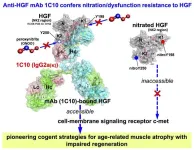(Press-News.org) Research Highlights:
A clinical trial with adults who have atrial fibrillation (AFib) and an implanted heart device found similar improvements to the amount of time they experienced arrhythmia regardless of whether they received standard care (education pamphlets about healthy diet and exercise), followed a lifestyle/risk factor modification program, or took metformin and followed a lifestyle/risk factor modification program.
AFib burden, a measure of how much time a patient experiences atrial arrhythmia, improved during the treatment period — particularly in the standard of care and lifestyle risk factor modification groups.
Lifestyle and risk factor modification was associated with significant improvements in AFib symptom scores, which measure the patient’s perceptions about the severity of symptoms.
Initially, treatment with metformin alone tended to show worse AFib burden compared to standard of care, but was not significantly different at later periods in the year, the researchers noted.
Note: The study featured in this news release is a research abstract. Abstracts presented at American Heart Association’s scientific meetings are not peer-reviewed, and the findings are considered preliminary until published as full manuscripts in a peer-reviewed scientific journal.
Embargoed until 10:23 a.m. CT/11:23 a.m. ET, Monday, Nov. 18, 2024
This news release contains updated information from the researcher that was not in the abstract.
CHICAGO, Nov. 18, 2024 — Treatment with the Type 2 diabetes medication metformin, lifestyle changes, or a combination of both did not improve atrial fibrillation (AFib) burden or progression when compared with standard care, according to preliminary late-breaking science presented today at the American Heart Association’s Scientific Sessions 2024. The meeting, Nov. 16-18, 2024, in Chicago, is a premier global exchange of the latest scientific advancements, research and evidence-based clinical practice updates in cardiovascular science.
Metformin is a common medication to treat Type 2 diabetes because it decreases the amount of glucose made in the liver, which helps control blood sugar levels. AFib is the most common form of arrhythmia, an abnormal heart rhythm, and it can lead to stroke, heart failure or other cardiovascular complications. More than 12 million people are projected to have AFib in the U.S. by 2030, according to the American Heart Association’s 2024 Heart Disease and Stroke Statistics.
Previous research has indicated that lifestyle/risk factor modification to reduce cardiovascular risk factors can help reduce AFib burden, a quantitative term used to refer to the amount of time a person’s heart is experiencing the abnormal rhythms of AFib. Additionally, the study authors noted that recent genomic and genetic studies have suggested that improving the biochemical levers handling metabolic stress — the response to stressors that can cause an imbalance in energy supplies to cells — might help AFib.
“Interventions including weight loss, exercise and metformin act on an enzyme called AMP kinase, which is the master regulator of metabolic stress in the cells,“ said lead study author Mina K. Chung, M.D., FAHA, a cardiologist and professor of medicine at the Cleveland Clinic in Ohio. “In this study, we examined whether interventions including these might reduce AFib burden or progression.”
In this trial, called TRIM-AF, 149 adults who had AFib were randomly assigned to one of four treatment groups: standard of care (participants received educational pamphlets on healthy diet and exercise without individual counseling); metformin only; a lifestyle/risk factor modification program (including referral to a preventive cardiology team for diet and nutrition counseling as well as for an exercise prescription and to address other cardiovascular risk factors); or both metformin and the lifestyle/risk factor modification program. The patients in the lifestyle/risk factor modification groups were offered a diet and exercise visit every three months in the first year of the study and every six months in the second year.
The metformin-only group, the lifestyle/risk factor modification group and the combination lifestyle/risk factor modification and metformin group — but not the standard of care group — lost weight by the one-year follow-up but did not meet activity or fitness targets.
The study was open label, meaning both the researchers and participants knew which groups participants were in and which interventions they were receiving. Participants enrolled in the study had AFib and an implanted cardiac device, such as a pacemaker or implantable cardiac defibrillator, which could record the daily AFib burden, or average percentage of time each day they spent experiencing arrhythmia. Participants were followed for up to two years after enrollment in one of the four groups.
After the one-year follow-up, the analysis found:
The AFib burden decreased over time in the standard of care group, the lifestyle/risk factor modification group, and the lifestyle/risk factor modification and metformin group. The metformin group initially tended to show worsened AFib burden compared to standard of care, but at later time periods was not significantly different from baseline or standard of care, the researchers noted.
There were no significant differences in AFib burden change between the four groups.
The median baseline AFib burden was 5.5% in the standard of care group, 1.8% in the metformin group, 2.1% in the lifestyle/risk factor modification group and 6.5% in the combined lifestyle/risk factor and metformin group.
At 9-12 months, median AFib burden was 0.67% (relative change -73.5%) in the standard of care group, 0.62% (relative change -48.9%) in the metformin group, 0.13% (relative change -85.9%) in the lifestyle/risk factor modification group and 0.90% (relative change -72.4%) in the combined lifestyle/risk factor modification and metformin group, the researchers noted.
More than one-third of the study’s participants, in the two metformin groups, either did not start or had to stop the medication due to gastrointestinal side effects, which include diarrhea, nausea and stomach discomfort, the researchers noted.
All three intervention groups experienced weight loss (an average of 2.4% of their starting body weight in the metformin group, 2.1% in the lifestyle/risk factor modification group and 4.4% in the combined lifestyle/risk factor modification and metformin group), while the standard care group did not significantly change (lost 0.5%).
Neither of the lifestyle modification groups—those taking metformin and those not taking it—achieved the target weight-loss goal, an average of 10% of participant’s starting body weight, and fitness targets (2 MET improvement on stress testing) set for the study. Device-recorded physical activity times did not increase, and fitness, assessed through exercise testing, showed no significant improvement.
However, the researchers did see an improvement in atrial fibrillation symptom scores in the two lifestyle modification groups. According to Chung, this reinforces how exercise and weight loss may help people feel better.
“We were especially surprised by the decrease in AFib burden in the standard of care group. We analyzed periods before randomization and saw in all groups that the AFib burden increased. Then, upon randomization, we saw a decrease in AFib burden in all groups,” said Chung, who was also vice chair of the joint American Heart Association/American College of Cardiology 2023 Guideline for the Diagnosis and Management of Atrial Fibrillation.
“It is possible that the written [Cleveland Clinic] literature on diet and exercise we distributed to the standard of care group for participation in the study could have had a greater effect on reduction of AFib burden than we thought. This was a group of patients who were motivated with discussions to join a lifestyle/risk factor modification study. I think one of the key messages from this study is that talking to patients with AFib about lifestyle/risk factor modification and giving them written instructions or more intensive individualized instructions performed well. The metformin group also experienced a notably high rate of intolerance, which could have increased stress, and we do not know yet whether those who tolerated the metformin had other improvements,” Chung said. “However, at this time, metformin alone should not be recommended as an upstream therapy for atrial fibrillation. The combination of metformin and lifestyle/risk factor modification appeared to show some benefits, but these only reached levels similar to the standard of care arm.”
The researchers said they will continue to analyze the data to determine if people who tolerated metformin and stayed on it for two years have a reduction in AFib burden They will also examine AFib burden changes in people who had a higher AFib burden when they enrolled in the study.
One message from this research is the importance of randomized studies that compare interventions. “Prior nonrandomized studies have suggested a benefit of metformin in reducing AFib, however, non-randomization may have introduced bias,” Chung said.
The TRIM-AF study had several limitations, including its small size. In addition, the COVID-19 pandemic began in the middle of the study, which made it difficult to recruit participants and conduct in-person visits. Chung noted that they adapted by changing the protocol to allow virtual visits and by reducing the sample size from 200 to 150 participants. The study will complete two-year follow-up in the fall of 2025.
Study details, background and design:
The ongoing, two-year follow-up study, which started in 2018, is being conducted at the Cleveland Clinic in Ohio.
The study population included 149 adults who had AFib at the time of enrollment. Adults were evenly randomized into four treatment groups: 37 in the metformin only group; 35 in the lifestyle/risk modification group; 38 in the combined metformin and lifestyle/risk modification group; and 39 in the standard of care group.
At study enrollment, 118 (79.2%) participants had a diagnosis of hypertension; 13 (8.7%) had a diagnosis of Type 2 diabetes; 57 (38.3%) had a diagnosis of coronary artery disease; 102 (68.5%) had a pacemaker; and 47 (31.5%) had an implantable cardioverter defibrillator. There were no significant differences in the baseline characteristics between the groups, except there were more patients with hypertension in the two groups not receiving metformin compared to the two groups that received metformin (86.5% and 72%, respectively).
Study participants had an average age of 74. 61% of participants self-identified as men; 39% as women. 96.6% of the participants identified as white adults, 2.7% as Black adults and 0.7% as Asian adults.
Co-authors, disclosures and funding sources are listed in the manuscript. The study was funded by grants from the American Heart Association Atrial Fibrillation Strategically Focused Research Network and the Soter Kay Foundation.
Statements and conclusions of studies that are presented at the American Heart Association’s scientific meetings are solely those of the study authors and do not necessarily reflect the Association’s policy or position. The Association makes no representation or guarantee as to their accuracy or reliability. Abstracts presented at the Association’s scientific meetings are not peer-reviewed, rather, they are curated by independent review panels and are considered based on the potential to add to the diversity of scientific issues and views discussed at the meeting. The findings are considered preliminary until published as a full manuscript in a peer-reviewed scientific journal.
The Association receives funding primarily from individuals; foundations and corporations (including pharmaceutical, device manufacturers and other companies) also make donations and fund specific Association programs and events. The Association has strict policies to prevent these relationships from influencing the science content. Revenues from pharmaceutical and biotech companies, device manufacturers and health insurance providers and the Association’s overall financial information are available here.
Additional Resources:
Multimedia is available on the right column of the release link.
Link to abstract; and AHA Scientific Sessions 2024 Online Program Planner
AHA news release: Early Rhythm Control, Lifestyle Modification and More Tailored Stroke Risk Assessment Are Top Goals in Managing Atrial Fibrillation (Nov. 2023)
AHA news release: Lifestyle changes, meds effective to prevent or delay Type 2 diabetes; no change in CVD (May 2022)
AHA health information: What is Atrial Fibrillation?
For more news at AHA Scientific Sessions 2024, follow us on X @HeartNews,#AHA24
###
About the American Heart Association
The American Heart Association is a relentless force for a world of longer, healthier lives. We are dedicated to ensuring equitable health in all communities. Through collaboration with numerous organizations, and powered by millions of volunteers, we fund innovative research, advocate for the public’s health and share lifesaving resources. The Dallas-based organization has been a leading source of health information for a century. During 2024 - our Centennial year - we celebrate our rich 100-year history and accomplishments. As we forge ahead into our second century of bold discovery and impact, our vision is to advance health and hope for everyone, everywhere. Connect with us on heart.org, Facebook, X or by calling 1-800-AHA-USA1.
END
Lifestyle & risk factor changes improved AFib symptoms, not burden, over standard care
American Heart Association Scientific Sessions 2024, Late Breaking Science Abstract 4169382
2024-11-19
ELSE PRESS RELEASES FROM THIS DATE:
Researchers discover new cognitive blueprint for making and breaking habits
2024-11-19
Cognitive neuroscientists in Trinity College Dublin have published new research describing a brand new approach to making habit change achievable and lasting.
This innovative framework has the potential to significantly improve approaches to personal development, as well as the clinical treatment of compulsive disorders (for example obsessive compulsive disorder, addiction, and eating disorders).
The research was led by Dr Eike Buabang, Postdoctoral Research Fellow in the lab of Professor Claire Gillan in the School of Psychology and has been published as a paper, Leveraging ...
In a small international trial, novel oral medication muvalaplin lowered Lp(a)
2024-11-19
Research Highlights:
The oral medication muvalaplin may safely lower high levels of lipoprotein(a), also known as Lp(a), an independent, inherited risk factor for cardiovascular disease.
Muvalaplin is a small molecule inhibitor that prevents the bonding of the two protein components that combine to make Lp(a). There are no currently FDA-approved medications to lower Lp(a) levels, though other medications are currently being evaluated in clinical trials. Muvalaplin is the first oral medication developed to lower Lp(a) levels.
Results ...
Eradivir’s EV25 therapeutic proven to reduce advanced-stage influenza viral loads faster, more thoroughly in preclinical studies than current therapies
2024-11-19
WEST LAFAYETTE, Ind. — Eradivir, a preclinical biotech company, has developed a patent-pending antiviral therapeutic that reduces lung viral loads of advanced-stage influenza in preclinical studies quicker and more effectively than currently available therapies.
A single intranasal dose of EV25, a bispecific small molecule developed by Eradivir, acts faster than the current standard of care, eliminating the detectable virus within 24 hours. EV25 also has a window of efficacy of 96 hours postinfection, which is broader than the current standard of care.
A ...
Most Medicare beneficiaries do not compare prescription drug plans – and may be sticking with bad plans
2024-11-19
Every fall, millions of Medicare beneficiaries have the chance to pick a new stand-alone prescription drug plan that may be better suited for them, but most stick with the same plan.
A new study published today in Health Affairs Scholar suggests that 52% of Medicare beneficiaries with stand-alone Part D plans did not switch because they made no plan comparisons at all for 2024. Many of these beneficiaries (41%) also reported not knowing how to switch plans.
“Comparing these Medicare Part D plans is hard, so many beneficiaries just don’t do it. But beneficiaries who don’t compare plans may not notice if they are sticking with more expensive plans or ...
“What Would They Say?” video wins second place in international award for tobacco control advocacy
2024-11-19
DALLAS, Nov. 19, 2024 —“What Would They Say?” – the powerful spoken word poem produced on video by the American Heart Association, which is celebrating 100 years of lifesaving service as the world’s leading voluntary organization focused on heart and brain health, has taken second place in the 4th Annual Anthem Awards winning the Silver Award in the Education, Art & Culture Campaign - Non-Profit Community Engagement category. This international recognition celebrates the Association’s impactful work and historic commitment ...
Black Britons from top backgrounds up to three times more likely to be downwardly mobile
2024-11-19
Even when their parents are lawyers, doctors, or executives, Black Britons are substantially more likely to end up in working class jobs than their White peers, a new study from the University of Kent reveals.
Funded by the Leverhulme Trust, this research shows that Black men from the most advantaged families are three times more likely than White men from similar backgrounds to be in working class jobs beyond age 30. Black women are also twice as likely as White women to experience this kind of downward mobility. This is true even after removing ...
Developing an antibody to combat age-related muscle atrophy
2024-11-19
Fukuoka, Japan—We all age. And while humanity’s life expectancy has increased dramatically in the modern era, we still struggle with the inevitable health issues our bodies face as we get up in the years. For example, the decrease of muscle mass and function, leading to weakness and atrophy. This is a pressing concern in a super-aging society like Japan where—while people live longer—without proper muscle strength, quality of life can be drastically diminished.
In findings that may eventually lead to targeted ...
Brain aging and Alzheimer's: Insights from non-human primates
2024-11-19
“Brain aging is a biological process that comprehends degenerative, adaptive, and regenerative brain changes that elapse through maturity until the elderly.”
BUFFALO, NY- November 19, 2024 – A new review was published in Aging (listed by MEDLINE/PubMed as "Aging (Albany NY)" and "Aging-US" by Web of Science), on October 29, 2024, Volume 16, Issue 20, titled, ”Brain aging and Alzheimer’s disease, a perspective from non-human primates.“
In the review, Ferrer Isidro from the University of Barcelona and Reial Acadèmia de Medicina de Catalunya, explores the differences in ...
Can cells ‘learn’ like brains?
2024-11-19
Individual cells appear capable of learning, a behaviour once deemed exclusive to animals with brains and complex nervous systems, according to the findings of a new study led by researchers at the Centre for Genomic Regulation (CRG) in Barcelona and Harvard Medical School in Boston.
The findings, published today in the journal Current Biology, could represent an important shift in how we view the fundamental units of life.
“Rather than following pre-programmed genetic instructions, cells are elevated to entities equipped ...
How cells get used to the familiar
2024-11-19
A dog learns to sit on command, a person hears and eventually tunes out the hum of a washing machine while reading … The capacity to learn and adapt is central to evolution and, indeed, survival.
Habituation — adaptation’s less-glamorous sibling — involves the lessening response to a stimulus after repeated exposure. Think the need for a third espresso to maintain the same level of concentration you once achieved with a single shot.
Up until recently, habituation — a simple form of learning — was deemed ...
LAST 30 PRESS RELEASES:
Yale study challenges notion that aging means decline, finds many older adults improve over time
Korean researchers enable early detection of brain disorders with a single drop of saliva!
Swipe right, but safer
Duke-NUS scientists identify more effective way to detect poultry viruses in live markets
Low-intensity treadmill exercise preconditioning mitigates post-stroke injury in mouse models
How moss helped solve a grave-robbing mystery
How much sleep do teens get? Six-seven hours.
Patients regain weight rapidly after stopping weight loss drugs – but still keep off a quarter of weight lost
GLP-1 diabetes drugs linked to reduced risk of addiction and substance-related death
Councils face industry legal threats for campaigns warning against wood burning stoves
GLP-1 medications get at the heart of addiction: study
Global trauma study highlights shared learning as interest in whole blood resurges
Almost a third of Gen Z men agree a wife should obey her husband
Trapping light on thermal photodetectors shatters speed records
New review highlights the future of tubular solid oxide fuel cells for clean energy systems
Pig farm ammonia pollution may indirectly accelerate climate warming, new study finds
Modified biochar helps compost retain nitrogen and build richer soil organic matter
First gene regulation clinical trials for epilepsy show promising results
Life-changing drug identified for children with rare epilepsy
Husker researchers collaborate to explore fear of spiders
Mayo Clinic researchers discover hidden brain map that may improve epilepsy care
NYCST announces Round 2 Awards for space technology projects
How the Dobbs decision and abortion restrictions changed where medical students apply to residency programs
Microwave frying can help lower oil content for healthier French fries
In MS, wearable sensors may help identify people at risk of worsening disability
Study: Football associated with nearly one in five brain injuries in youth sports
Machine-learning immune-system analysis study may hold clues to personalized medicine
A promising potential therapeutic strategy for Rett syndrome
How time changes impact public sentiment in the U.S.
Analysis of charred food in pot reveals that prehistoric Europeans had surprisingly complex cuisines
[Press-News.org] Lifestyle & risk factor changes improved AFib symptoms, not burden, over standard careAmerican Heart Association Scientific Sessions 2024, Late Breaking Science Abstract 4169382



